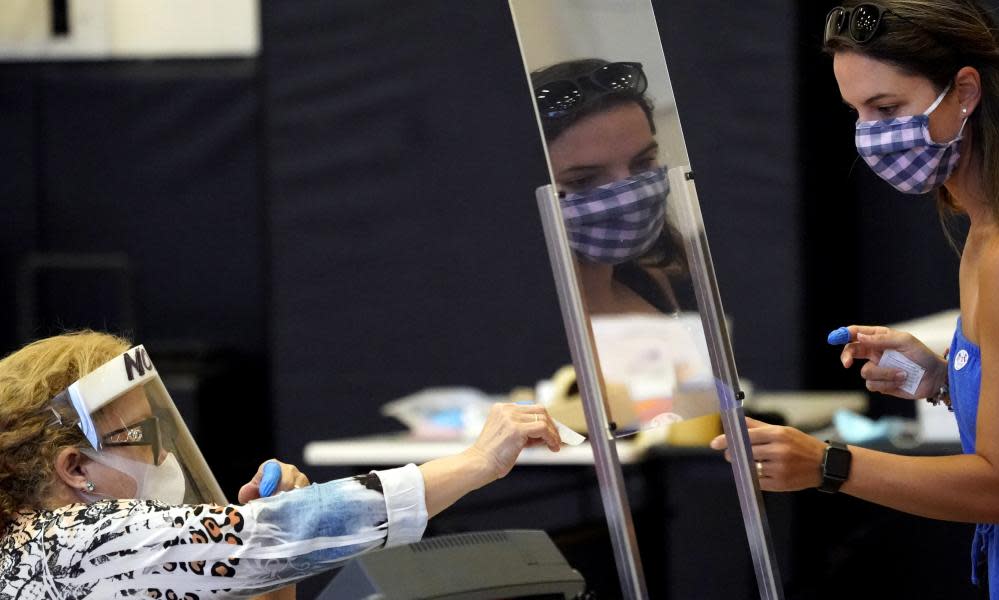Threats to US election workers take heavy and harrowing toll

- Oops!Something went wrong.Please try again later.
Happy Thursday,
In the United States, a quiet army of people work in towns, cities, and states across the country to make sure that elections hum along smoothly. They’re responsible for all the mechanics that ensure Americans can exercise their right to vote – like keeping track of complex data files, making sure that mail-in ballots get printed and go out on time, ensuring that polling places have enough workers, and making sure that every valid vote gets counted.
For a long time, these officials – elected in some places, appointed in others – have been largely invisible. That invisibility evaporated last year.
When Donald Trump began raising baseless claims about things like ballots being smuggled in and votes being flipped, these election officials became the target of his supporters’ rage. From state election officials to lower-level workers, they started receiving death threats, were followed in their cars, and even had people break into family-members’ homes, according to a harrowing Reuters report. Brad Raffensperger, Georgia’s Republican secretary of state, even had to move out of his home because of vicious threats.
About a third of election officials surveyed this spring said they felt unsafe because of their job, according to a new report released Wednesday by the Brennan Center for Justice. And about a fifth of the 223 officials described threats to their lives as a concern related to their work.
Nearly 80% of the officials surveyed said social media conspiracy theories and misinformation made it harder for them to do their jobs. And more than half said the platforms had made their jobs more dangerous.
US attorney general Merrick Garland condemned attacks against election workers in a speech last week, and pledged law enforcement would investigate when federal laws were violated.
“We have not been blind to the dramatic increase in menacing and violent threats against all manner of state and local election workers, ranging from the highest administrators to volunteer poll workers,” he said. “Such threats undermine our electoral process and violate a myriad of federal laws.”
The Brennan Center report offers a range of suggestions for reform that can better protect election officials, including establishing a DoJ taskforce focused on threats against election workers, passing laws that give workers more privacy protections, and implementing measures that insulate officials from political pressure.
But the attacks have already taken their toll – many election officials retired or left their jobs after a bruising 2020 election. That’s alarming to many voting rights groups because it could lead to a loss in institutional knowledge as well as a drop in the polling place workers and other staff needed to ensure elections run smoothly.
A swell of candidates who embraced the baseless idea that the election was stolen are also running for key election administration positions. If elected, those officials would be able to wield enormous power over implementation of election rules, including ballot counting.
“A new, more dangerous front has opened in the voting wars, and it’s going to be much harder to counteract than the now-familiar fight over voting rules. At stake is something I never expected to worry about in the United States: the integrity of the vote count,” Richard Hasen, an election law professor at the University of California, Irvine, wrote in an op-ed earlier this month. “The danger of manipulated election results looms.”
Also worth watching…
The New York Times had an extraordinary story detailing how GOP-backed voting restrictions moving through state legislatures would curtail ballot access for people with disabilities.
Senator Joe Manchin released a list of provisions he would support in a sweeping voting reform bill in congress. That’s a welcome sign to many advocates, who feared Manchin’s recalcitrance would kill any hope of voting reform. Manchin still does, however, support the filibuster, which would block Democrats from advancing any measure.
Democrats in the Texas House of Representatives, heralded for halting a sweeping voting restrictions bill in their state, met with both Senate Democrats and Kamala Harris this week to urge them to pass sweeping voting reforms in Washington.
Attorney General Garland gave a speech last Friday on increasing voting rights enforcement by the department. Garland announced that the department’s voting section was doubling the number of attorneys there in the next 30 days. While that was a welcome announcement, observers are still waiting to see what kinds of voting challenges and cases the DoJ chooses to bring.

